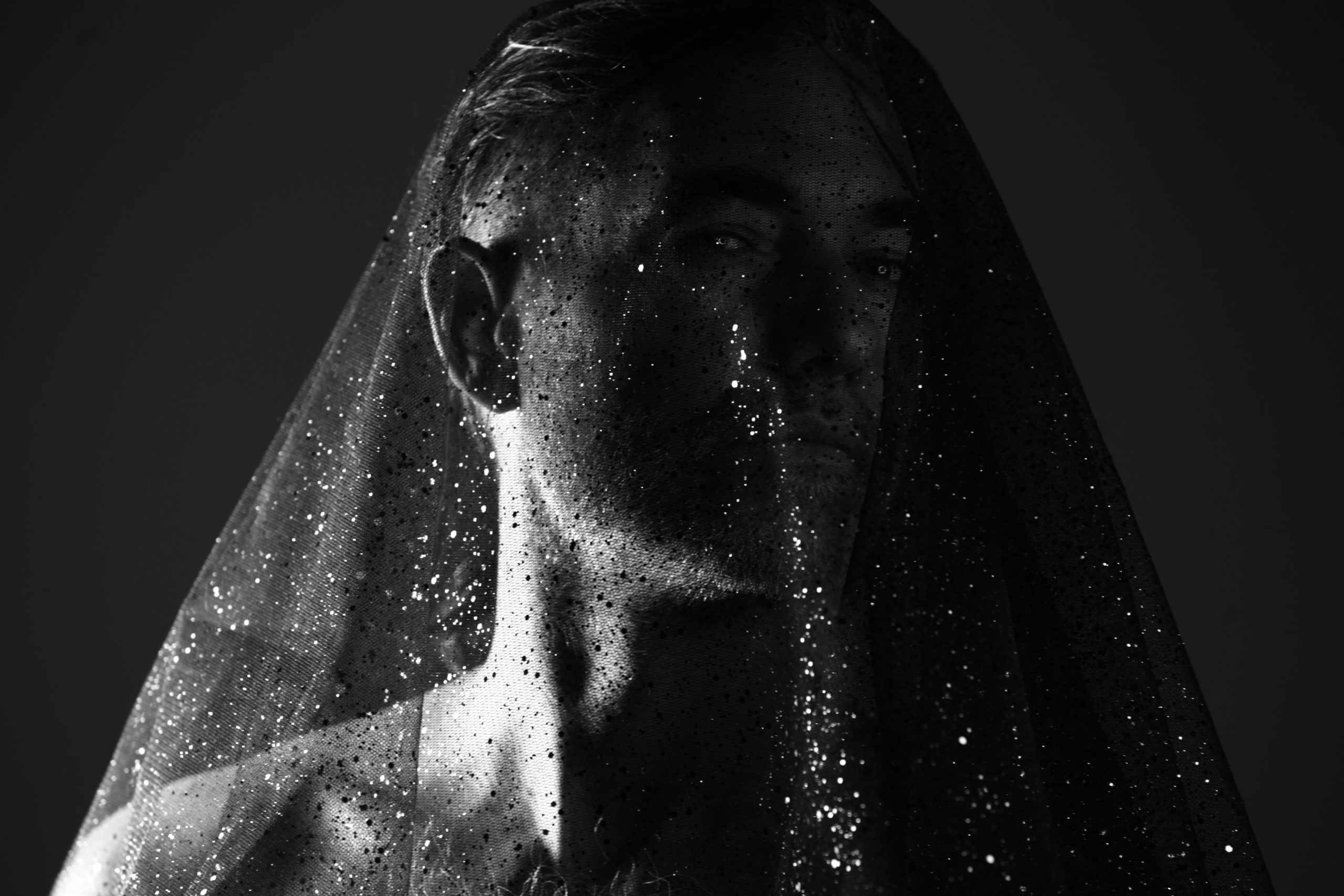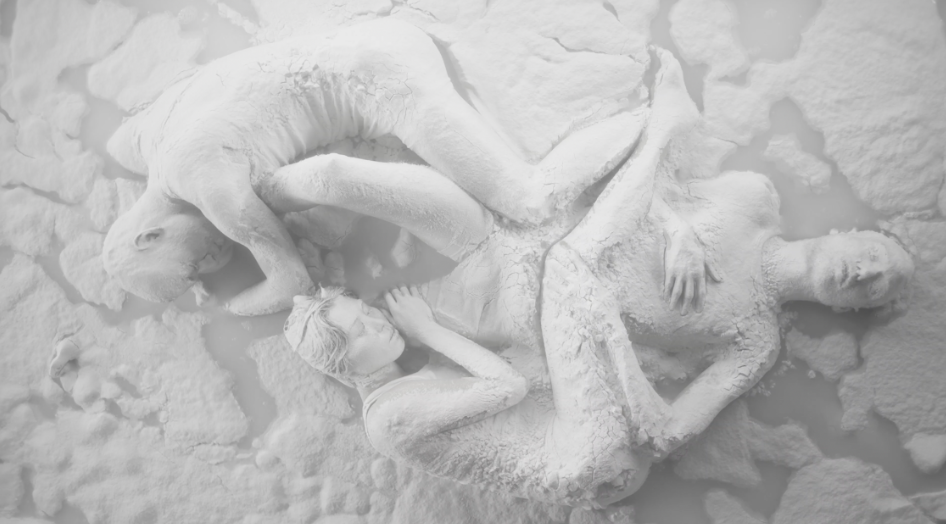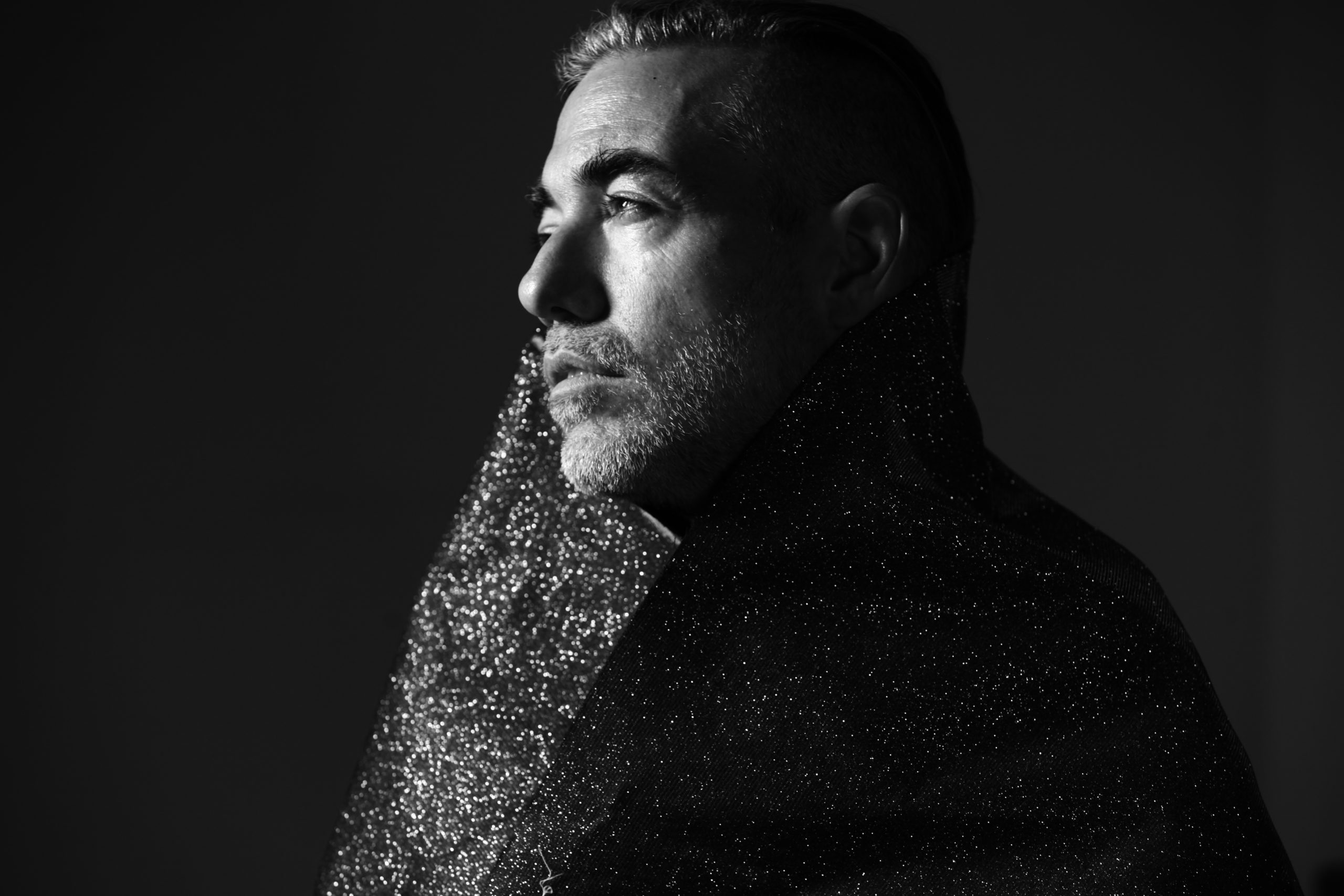Argentine producer and ethnomusicologist Luis Maurette is the artist behind UJI, a musical project he has cultivated after years of exploring the rhythms of the earth, time, electronic music, and more. Maurette was also part of the duo Lulacruza with Colombian Alejanda Ortiz for 12 years. At the end of 2022 he launched his latest major project called Timebeing, an interdisciplinary multimedia journey that includes music, audiovisual pieces and an immersive live show.
First tell us about your pseudonym… why UJI?
The word is originally Japanese. It has different pronunciations depending on who says it, but I like all versions. UJI is a musical pseudonym, but it’s been around long before I started making music under that name. About 10 years ago I started reading a book about architecture and I found this word. It was a book about Zen Buddhism, which talks about time, and when you translate the word from Japanese to Spanish or English it translates as timebeing. Existence is made of time and that is an idea that in Buddhism is used for meditations… there is no resolution or answer around time. It resonated with me a lot, because for me music is the art of time, manipulating time.
The sensation of the notion of time is something I always liked to explore. When I found that word I made a folder with that name, where I kept my work. When I was with Lulacruza, my first musical project, I also did other personal things and I put them in the UJI folder. And, although none of that is what ended up being UJI publicly, my experiments were there… And when Lulacruza ended and I wanted to do something as a soloist, it was obvious that it had to be UJI.
I started using the name and then I discovered that it’s also a town where matcha tea is made… Japanese is complex, it’s a language of many interpretations, so if you take the “u” and “ji” separately it can come to mean other things, like healing or the universe. Someone even told me that it can mean mosquito, so I find that enriching, to be able to have a word or a concept and suddenly you realize that it expands, and that it has other edges to it. I find that amazing.

Could you tell us a little bit about your history? We know that you lived in several countries…
My father worked in a company that later became a multinational and they moved him from one place to another. When I was six months old I left Buenos Aires for the first time, the first stop was Santiago de Chile. I lived there until I was a little over a year, and later we went to the United States, then to Ecuador and then to Mexico. At about 14 I returned to Argentina, and after finishing high school, I went to Boston to study at Berklee College of Music and then I did a master’s degree in San Francisco and so on… So all those experiences made me feel like I was from nowhere.
Growing up, I remember when I was 10 or 11 years old, I was bullied in Mexico for having an Argentine accent and then I went to Argentina and they laughed at me because I spoke like a Mexican. So, what was hard for me in my childhood, I later realized that it was actually an asset, because I had a much broader and multicultural vision than other people. Between the food, the customs, the smells, the sounds. For example, growing up in Quito, Ecuador and absorbing their customs, then learning about the culture of Mexico, all that made me able to identify myself, not only as an Argentinean, but as very Latin American in a broader sense.
How did you get to know the electronic genre in that context?
When I was in Boston I met Alejandra Ortiz, a Colombian singer, with whom we started the duo Lulacruza and that led me to explore Latin America even more. Something happened to me that happens to a lot of people when they leave their country, – for example, to the United States or Europe-, and that is that you start to realize a lot of things about your origin and your culture that you no longer have in that new place. I realized that I had a musical sensibility that was very connected to Latin American folklore that my classmates at the university didn’t have. They came more from pop, rock, jazz or traditional electronic music.
I realized that I had a musical sensibility that was very connected to Latin American folklore
At that time I asked myself how to make electronic music, but more related to the Earth. There was no one doing that, and when I got together with Alejandra and we started Lulacruza, we explored precisely that, and it led me to travel a lot around Colombia. We were together from 2003 to 2012 or 2015, a period in which I traveled a lot around Latin America. I participated in ceremonies, I was in vision quest, going to film the north of Argentina and traditional music. I did a lot of exploration towards the roots, always with the question of how to merge these two worlds.
I think that, in a way, having lived in different countries, my identity started to be built from being the different one. So, when I was at Berklee I was also a bit different. In a production class, for example, where everyone brought pop and rock songs, I presented a song that only had one beat and they wondered what I was going to do with it… Things happen, you enter an institute like Berklee, where you meet these incredible musicians, and the first day you go to a concert where you listen to all your classmates who sound amazing, then you get depressed the first day and think, “I’m just starting and I’m not going to be like them even in four years from now”. That forced me to define myself, to think about my identity. In a school where there are 3,000 guitarists, you have to ask yourself what makes you unique. That forced me to revisit my history, to ask myself where I come from, to realize my attributes, what I could bring to the table. Through that exploration I was forging a little bit of what I can now transmit as UJI.
How did you work your way into the genre since then?
I’ve had this exploration or question for many years. When we started with Lulacruza it was really like being in the jungle with a machete, opening the way. You had to explain everything to the public, nobody understood anything, it was really very hard work and there were no social networks. Today there is a niche, there are artists who have already made their path, there are two or three generations of artists who are inspired by Chancha Vía Circuito, Nicola Cruz, who have been the pioneers. There is already a kind of party movement of events that are looking for that. Anyway, in relation to what is happening musically, it is tiny, but it is much bigger than 10 years ago.
Now we are in a particular moment, after the pandemic. Before, there was a movement that was growing uniformly, and after two years without tours, in which colleagues did not meet, the scene is more fragmented. Also the pandemic brought a lot of futurology, much more metaverse, cleaner, electronic aesthetics and we lost the focus of tradition. Although that’s always there, it’s not the current trend… In 2018 everything was Africa and Latin America and roots, you could see it even in graphic design. So, as an artist you have to be reinventing yourself all the time.
Has that affected your current work?
I think Timebeing is the result of that. As I said, the fusion between the ancestral and the modern has already been done, so what now? These are questions that I ask myself. At the moment, I think it has to do with the technology of ritual, with time, with seeing what are the new customs and mythologies in which we believe today. These are the things that I am interested in exploring with music.

What do you mean by ritual technology?
Human beings discovered or invented ways to connect with the invisible world, which transcends us, thousands of years ago. We discovered that by breathing in a certain way, repeating certain sounds, moving in a certain way, in a group or individually, or consuming a certain plant, etc., we connect with something that transcends us in this corporeal material world. I call that technology, because it is a possibility that humans have discovered and used fot thousands of years. It is a millenary technology, it was not invented now. With the Industrial Revolution we moved away from there, also because of the atrocities that were committed in the churches, people moved away from there, and with that, the New Age, half magical emerged, which discredits it a little bit. So I like the word technology because it gives a veracity to the ritual. I mean, there is the New Age, but there are also monks meditating and connecting with something.
Human beings discovered or invented ways to connect with the invisible world, which transcends us, thousands of years ago.
I feel that there is the possibility of developing it as technology and music is at the center of that, it has always been used as the bridge to connect with the other world. I like to talk about the invisible world because the interpretation of what that other side is, is made by each individual, but nevertheless opens the possibility that something else exists. For example, in the experience of being at a concert listening to music, there is something else that happens, that is inexplicable, that has to do with emotions, with the spiritual realm.
Do you feel that there was a moment when you started that exploration?
In my 20’s I started going to electronic music parties, I took ecstasy, Ayahuasca, my perception opened up, the altered states of perception opened up. All that could ramain a party thing and nothing more, but then if you discover all the work that is done in ceremonies and all the magic that happens in those spaces, you begin to understand that there is something behind it, there is a work and an order, a way of doing things.
We in the western cultures think that time is chronological and that what changes is our perception of time. For example, five minutes feels fast or slow, but it is always five minutes. There are certain indigenous cultures that think that’s not it. That in reality time doubles, that is to say, if one feels that they are longer, it is because they are really longer, it is not only a perception of matter, but matter itself is what changes.
Today I can put all this exploration in this concept, in this synthesis. Before, I didn’t have this idea as developed, but from all the experiences, the exploration and the desire to transmit something, Timebeing resulted. That’s also how I made the most out of writing a script, which is the film, so everything starts to macerate. When you work on something, edit it and then open and edit it again, the concept gets closer to the essence of what you want to say every time .
Where do you find inspiration today, what situations or experiences facilitate your creativity?
First I find inspiration in nature and silence. When you are in the city, for example, Buenos Aires, a big city, you are in the middle of it, doing things and suddenly you get out of there and you wonder why I don’t do this more often… There is something there that is very inspiring, that makes me want to make music. On the one hand, that and, on the other hand there are people, collaborating, listening… It makes you want to create with other people and through that, bonds are strengthened.
I feel that music is a language that transmits everything that we don’t know how to transmit with words, so sometimes you play with someone… you make a couple of chords and just cry together. Because there is something that is expressed. I think that today we are in a renaissance of music and art, because there is access to so much information. You go to Spotify and there is a lot of good music and suddenly you discover a new artist. There are a lot of young people doing things, now there are tools you can have on your computer, everything you want to learn and see is available.

I also like cooking a lot, the art of flavors and smells, it takes me out of this world of ideas and concepts, it takes me to a very simple place… I feel that today I feel very nourished by simple things. There is something about being outside, cooking, being with friends, appreciating the simple things. You see the spring and how the flowers are coming out little by little, living day by day.
I come from many years of traveling, trying to “unmask the mystery”, getting into ceremonies, looking for everything, the limit and intense sensations. But I think it’s a stage, I don’t think I’ll stay here forever. Nowadays I’m appreciating simplicity, softness and knowing that not everything has to be always intense to be more real.
Tell us a little more about the idea of Timebeing.
I think there is something that connects us with time, which is not manifested in the physical, all those stories are intertwined in Timebeing. We achieved a piece that I am very proud of, the story is told in eight video clips and each one can stand on its own. That’s why we released each one separately, but if you see it as a whole, as a single piece, the characters are connected. Everything from a more abstract narrative, there is no dialogue, but it is told through movements, dance, visuals, symbols… It builds up.
How was the creative process of Timebeing?
I did this with art director Jazmin Calcarami, and really loved doing this work. About 100 people participated, I had never done a production of this size, and I really enjoyed it a lot. Collaborating with other people, from other places and areas, from the producer to the director of photography, the costume designer, the art director. In every meeting I had to think about colors, wardrobe, casting, about how to really tell a story and transmit it from all those areas, all the facets of art.
Something I really like is to begin to see everything in life as art, to everything you do, to put that design eye on it, that has a value. In a way, it is also a technology of ritual, if one embellishes the outside, it is also reflected inside. The process was very satisfying for me.

It was very crazy because some things that the film talks about began to happen to us, there began to be many synchronicities. For me, Timebeing is about that, about time travel, how the past self leaves something for the present self. You have to be attentive to those things and be in that communication, start doing it more consciously. I think the whole team was on that frequency, it was all very synchronous and we had to get on that wave. And so, when it was over, everything kind of dissolved. It’s like a movie set, very intense for a while and then you never see yourself again. A very strong group was put together and then everyone went their own way. It is an intense experience.
What projects are coming up now, what is UJI currently working on?
On the one hand, I am eager to show this project to the world, to go out and play the music, to show the film at different festivals, to follow the wave of all this. We have to see what the echoes are. On the other hand, all year 2022 I was working on the music for a ballet. I was contacted by a very important dancer from Argentina named Herman Cornejo. He is a soloist at the American Ballet Theater in New York, and he called me to do the music for his first work as a creator.
We spent the whole year working on the piece, which has a very interesting story: Niyinski, a Russian ballet dancer and choreographer was in Argentina around 1910 and at that time he talked to some Argentine writers. They decided to do a work based on a Guarani legend and made the libretto and everything, the music was going to be done by Stravinski. Then Niyinski had some mental health issues and stopped dancing, so the play was never made. It had even been announced in Paris and Buenos Aires. Herman decided to retake that work and make a modern version.
So we worked on that and the work premiered in December 2022 at the Teatro Bicentenario, in San Juan. It is a work with 15 dancers on stage and it lasts an hour. It will be touring during this year, and then I will see what comes next. I want to make new music, but take it slowly. I like to finish something and then start over. I am a musician by trade, every day I make chords, sounds, music and themes. But I’m interested in seeing what I really want to say, I’m interested in exploring and that idea doesn’t become clear to me until a process is finished. Maybe I want to make a funk record, I don’t know, something lighter, I’m probably going to do something less conceptual.
What do you expect from your work and its interaction with people?
My ideal situation is always that a concert is a ritual, that people have things happen to them, move them. Nowadays music is used a lot to entertain us, in the best of cases to accompany us in an emotion. But the ancient force of music, which is to be a bridge to connect with something else, that’s what interests me. I’m interested in opening that space through my concerts. It’s up to each person if they want to enter it or not, and how to do it… Dancing is a bit like that, moving to the music. I think that’s why electronic music and raves are very popular. Thousands of people dancing at the same time to hypnotic rhythms, the energy going up and down… There’s something about that that’s inherent in our human nature. I’d like to explore that more deeply. I’d like people to really have this sense of being united, of a more profound purpose… I don’t know, pop society leads us a lot to shrink our possibilities as humans, as beings. I propose to open it up, we are much more than what they want us to think.

